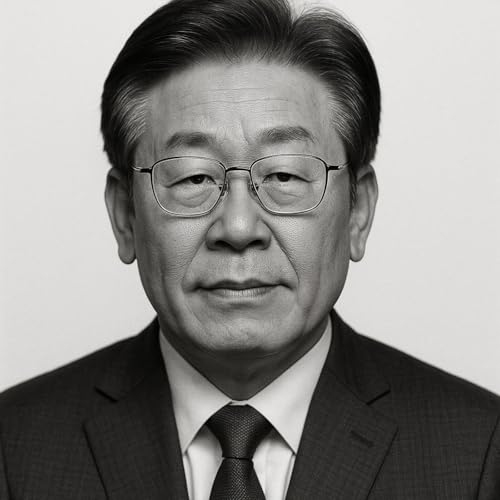
Biography Flash: President Lee Jae-myung's 100-Day Whirlwind of Diplomacy, Economy & Safety
Failed to add items
Sorry, we are unable to add the item because your shopping cart is already at capacity.
Add to basket failed.
Please try again later
Add to Wish List failed.
Please try again later
Remove from Wish List failed.
Please try again later
Follow podcast failed
Unfollow podcast failed
-
Narrated by:
-
By:
About this listen
President Lee Jae-myung’s past few days have been a whirlwind of national milestones, policy announcements, business moves, and social media flair; let’s dive in. Lee just crossed his 100th day in office, marking the occasion with a high-profile press conference covered by outlets like The Diplomat and Arirang TV. He used the event to set the tone for the next phase of his administration, vowing to rebuild the nation and achieve national unity while elevating South Korea’s global stature. The focus was squarely on practical diplomacy, with Lee reflecting on recent summits: he attended the G7, held bilateral meetings with Japan and the U.S., and signaled a willingness to reduce inter-Korean tensions—halting loudspeaker broadcasts along the border and reviving the military accord, as discussed on Arirang TV and highlighted by international analysts.
Diplomacy wasn’t the only headline. Lee’s domestic leadership is tightly focused on safety, economic pragmatism, and government reform. According to Korea JoongAng Daily, his signature theme has been the “person”—used 230 times in speeches—underscoring his push for accident prevention and worker safety. He has directly ordered strict oversight of construction, calling repeated accidents “murder by willful negligence,” and even threatened companies like Posco E&C with having licenses revoked. His latest social media post, reported by MK, translated this into action, previewing a plan for labor inspectors and the Minister of Employment and Labor to include the warning “If you fall, you will die” on official business cards—a move meant to spotlight the government’s zero-tolerance stance against workplace accidents.
Economically, Lee has achieved a notable moment: the KOSPI index hit an all-time high, closing at 3314.53. Lee was quick to share this on X (formerly Twitter), framing it as a sign of rising investor confidence fueled by his market policies and anticipation for further reforms. Analysts point out that Lee’s economic team—bolstered by practical policy choices like supplementary budgets and AI investment committees—is working to maintain momentum, particularly as South Korea just finalized a new trade deal with Washington, leveraging a $350 billion fund to reduce tariffs from 25% to 15%. Korea JoongAng Daily and Responsible Statecraft called this a government-led strategy for recovery, with Lee advocating state-driven growth and global leadership, especially in AI.
Public appearances have been frequent; Lee chaired key Cabinet meetings, met with business leaders, and most recently spoke out regarding the U.S. immigration raid at the LG-Hyundai plant in Georgia, defending Korean workers and pushing for fair treatment. On social media, Lee’s posts blend hard data with emotional messaging—such as his recent pledge to root out workplace safety fears and establish tough consequences for corporate negligence.
While most reports are solid, speculation lingers about the long-term diplomatic effects. Experts agree Lee has normalized relations with Japan and the U.S., but caution that full restoration is a work in progress. North Korea remains unresponsive, and regional tensions are still high, especially with ongoing shifts between Beijing, Moscow, and Washington.
Thank you for tuning in to Biography Flash. If you want more updates on Lee Jae-myung, subscribe now and search for Biography Flash for the latest and greatest stories in global leadership.
Get the best deals https://amzn.to/4mMClBv
This content was created in partnership and with the help of Artificial Intelligence AI
No reviews yet
In the spirit of reconciliation, Audible acknowledges the Traditional Custodians of country throughout Australia and their connections to land, sea and community. We pay our respect to their elders past and present and extend that respect to all Aboriginal and Torres Strait Islander peoples today.



